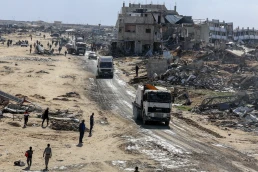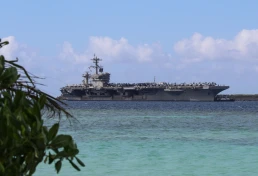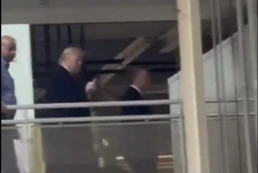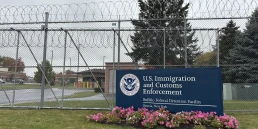Let us not be resigned to pessimism about the chaotic world situation. Instead, let us be as determined as our forebears, and, united as one, with hope in our hearts, take collective action. Our unity will move leaders now relying on nuclear deterrence to shift their policies. We could make that happen.
By Kazumi Matsui, The Mainichi
HIROSHIMA — The following is the full text of the Peace Declaration read on Aug. 6 by Hiroshima Mayor Kazumi Matsui at a ceremony to mark 79 years since the 1945 atomic bombing of the city.
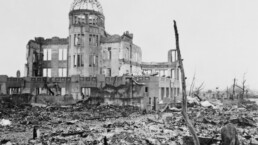
Citizens of the world, what do you think? Are more powerful nuclear forces necessary for national security? What about arms races, competing to maintain superiority over other nations? Russia’s protracted invasion of Ukraine and the worsening situation between Israel and Palestine are claiming the lives of countless innocent people, shattering normal life. It seems to me that these global tragedies are deepening distrust and fear among nations, reinforcing the public assumption that, to solve international problems, we have to rely on military force, which we should be rejecting. Given such circumstances, how can nations offer safety and security to their people? Is that not impossible?
Through the pillars under the Peace Memorial Museum, we can see the Cenotaph for the A-bomb Victims. Anyone praying at the Cenotaph can look straight through it to the Atomic Bomb Dome. Peace Memorial Park, with these structures on its north-south axis, was built in accordance with the Hiroshima Peace Memorial City Construction Law, enacted 75 years ago today. Built by the people of Hiroshima and many other seekers of peace, it has become a place to memorialize the victims and to think, talk, and make promises to each other about peace.
If, after the war, Japan had abandoned our Peace Constitution and focused on rebuilding our military, the city of peace Hiroshima is today would not exist. Standing here, we can all feel our predecessors’ determination to eliminate the scourge of war, trusting in the justice and faith of peace-loving people around the world.
Expressing that determination, one hibakusha continually communicated the spirit of Hiroshima. “Now is the time to turn the tide of history, to get beyond the hatreds of the past, uniting beyond differences of race and nationality to turn distrust into trust, hatred into reconciliation, and conflict into harmony.” This uplifting sentiment was written by a man who, as a 14-year-old boy, saw scenes from a living hell — a baby with skin peeled down to red flesh next to its mother burned from head to toe, and a corpse with its guts strewn out on the dirt.
In 1989, a massive people’s movement for democracy brought down the Berlin Wall, the predominant symbol of the Cold War. President Gorbachev expressed humanity’s collective need for peace and his determination to stop the arms race, end nuclear terror, eradicate nuclear weapons, and relentlessly pursue political solutions to regional conflicts. He and U.S. President Reagan worked together through dialogue to bring the Cold War to an end, which led to the United States and the Soviet Union concluding the Strategic Arms Reduction Treaty. They demonstrated that policymakers can overcome even critical situations through resolute commitment to dialogue.
Let us not be resigned to pessimism about the chaotic world situation. Instead, let us be as determined as our forebears, and, united as one, with hope in our hearts, take collective action. Our unity will move leaders now relying on nuclear deterrence to shift their policies. We could make that happen.
To extinguish the suspicion and doubt that create conflicts, civil society must foster a circle of trust through exchange and dialogue with consideration for others. We must spread beyond national borders the sense of safety we feel in our daily lives. The crucial step here is to share and empathize with the experiences and values of others through music, art, sports, and other interactions. Through such exchange, let us create a world in which we all share the Culture of Peace. In particular, I call on our youth, who will lead future generations, to visit Hiroshima and, taking to heart what they experience here, create a circle of friendship with people of all ages. I hope they will ponder what they can do now, and act together to expand their circle of hope. The city of Hiroshima, working with Mayors for Peace, which now has more than 8,400 member cities in 166 countries and regions, will actively support community endeavors to raise peace consciousness.
Last fiscal year, approximately 1.98 million people from around the world visited the Hiroshima Peace Memorial Museum. This record number is evidence of unprecedented interest in the atomic-bombed city and a rise in peace consciousness. My hope is that all world leaders will visit Hiroshima, experience the will of civil society, gain a deeper understanding of the atomic bombing, and hold in their hearts the hibakusha plea, “No one should ever suffer as we have.” Then, while they are here, I hope they will, with iron resolve, issue a compelling call for the abolition of nuclear weapons.
Twice in a row the Nuclear Non-proliferation Treaty (NPT) Review Conference has failed to adopt a final document. These failures have revealed a harsh reality, namely, the enormous differences among countries with respect to nuclear weapons. I hope the Japanese government, which has declared repeatedly that the NPT is the cornerstone of the international nuclear disarmament and non-proliferation regime, will exercise strong leadership, calling all countries to transcend their positions and engage in constructive dialogue toward a relationship of trust. Furthermore, I request that Japan, as a practical effort toward a nuclear-weapon-free world, participate as an observer at the Third Meeting of States Parties to the Treaty on the Prohibition of Nuclear Weapons to be held in March next year. Subsequently and as soon as possible, Japan must become a party to the treaty. In addition, I demand that the Japanese government strengthen measures of support for the hibakusha, including those living outside Japan. Now that their average age has exceeded 85, the government must accept that they are still suffering the many adverse emotional and physical effects of radiation.
Today, at this Peace Memorial Ceremony marking 79 years since the bombing, we offer our deepest condolences to the souls of the atomic bomb victims. Together with Nagasaki and likeminded people around the world, remembering once again the hibakusha struggle, we pledge to make every effort to abolish nuclear weapons and light the way toward lasting world peace. Citizens of the world, let us all, with hope in our hearts, walk with Hiroshima toward tomorrow’s peace.
Recent Posts
Israeli Ban on 37 Aid Organizations Expected to Have Devastating Impacts Across Palestine
January 16, 2026
Take Action Now Aid organizations say Israel’s recent ban of 37 groups has dealt a severe blow to humanitarian work across Palestine. In Gaza, it…
U.S. Surging Military Assets To the Middle East To Prepare for War With Iran After Trump Postpones Attack
January 16, 2026
Take Action Now Reports claim that Netanyahu asked Trump to delay the attack as Israel wants more time to prepare for counterattacksBy Dave…
Ford worker suspended after confronting President Trump over Epstein files during Michigan plant visit
January 15, 2026
Take Action Now A viral exchange inside a union auto plant has triggered union scrutiny, political backlash, and renewed questions about the…
ICE Detention Expands Dramatically; 70,000 Immigrants Now Jailed, Deaths Increase
January 15, 2026
Take Action Now Four more people have already died in detention in just the first two weeks of 2026.By Amy Goodman and Aaron Reichlin-Melnick,…

